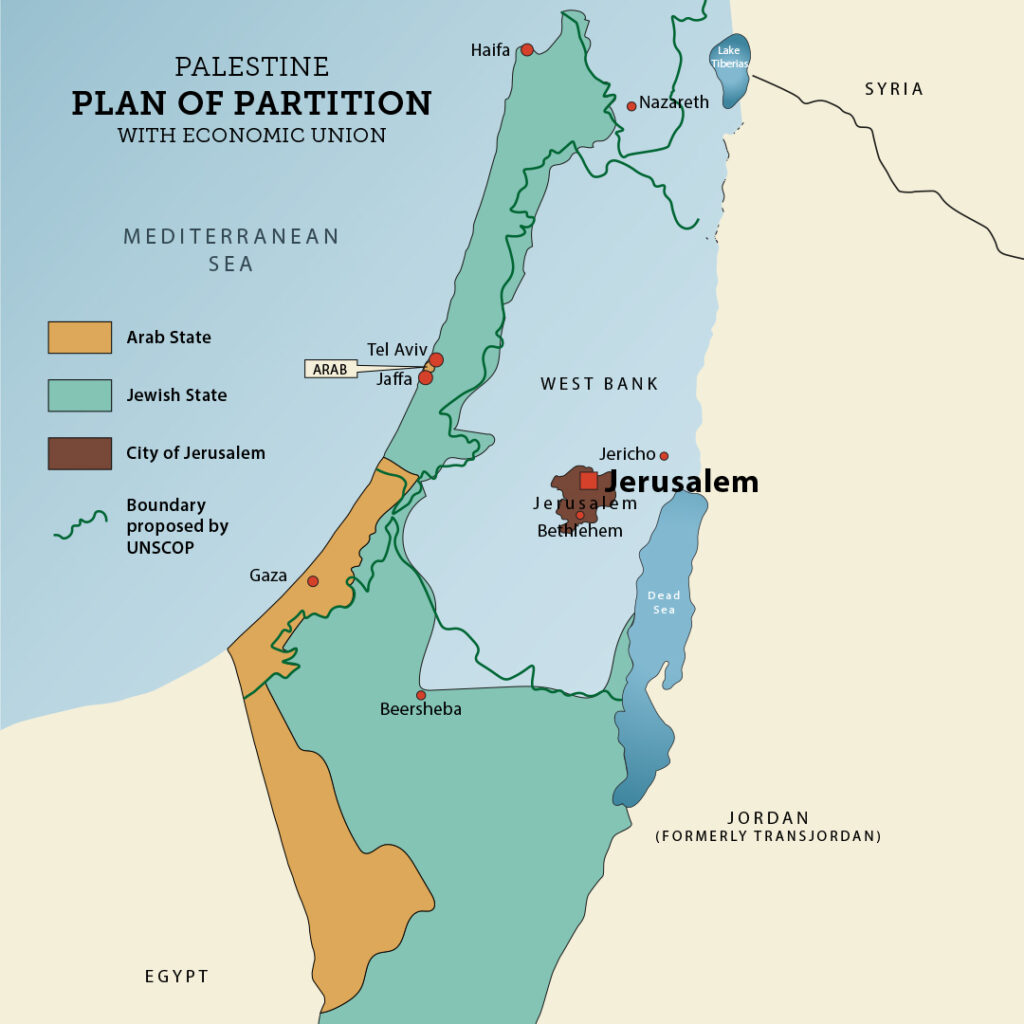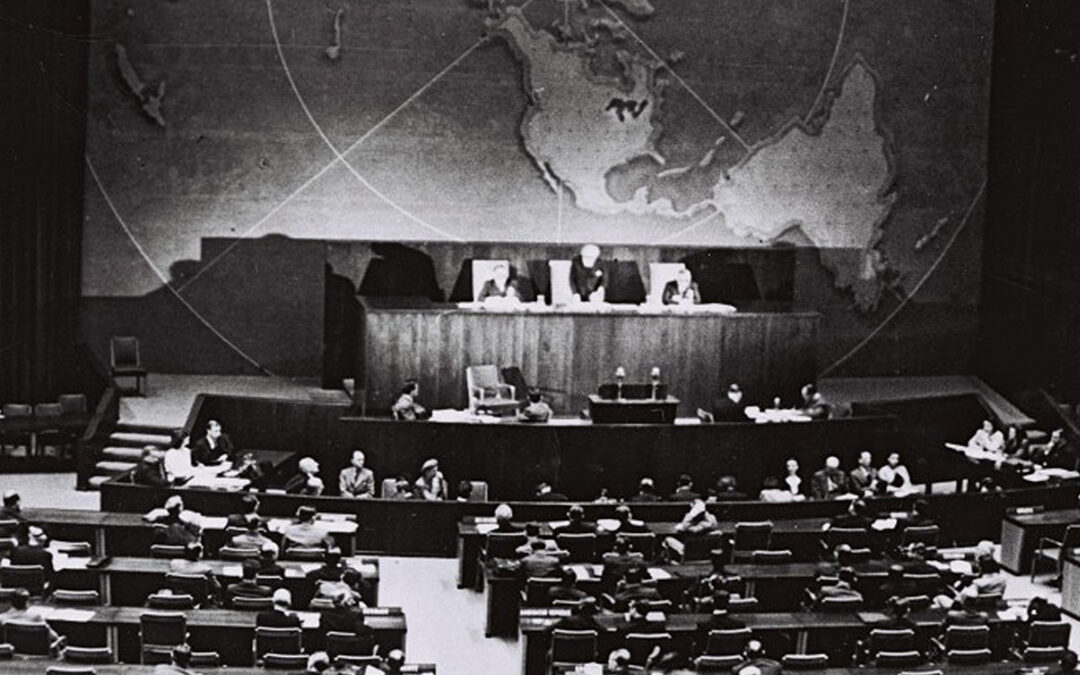THE HISTORY OF ATTEMPTS TO BRING PEACE TO ISRAEL
EDITOR’S NOTE: It is impossible to understand the current situation without first understanding what has come before. Here is the history of Israel and the many peace plans that have been proposed through the decades.

At the end of World War II, with all of its horrors of the Holocaust, devastated Jewish survivors in Europe longed for a return to their homeland. Their dreams were to be delayed when Great Britain remained in control of Palestine, as it had since the defeat of the Turks in World War I, by mandate of the United Nations, and with a growing dilemma: how to walk the tightrope between world opinion and the Arab nations.
After the shock and revulsion of the Holocaust, much of the world increasingly demanded that the Jews be allowed to return to their homeland in Palestine—arguably thought to be a place of safety for them. Arabs in the region were adamantly opposed to the move. Greatly frustrated by the situation, the British announced in February 1947 that control of Palestine would be ceded to the United Nations, even then a hotbed of anti-Semitism.
Journalist Eric R. Mandel tellingly wrote of the cultural relativism that still today grips the UN:
“Non-democratic states overwhelmingly control the UN. They often mouth the words of moderation, but defend nations that give sanctuary to terrorists. How else can one explain that some of the most odious nations on earth are elected to the UN Human Rights Council? In fact, Israel’s judge and jury at the UN are often nations that enable terrorism and anti-Semitism. To accurately judge the United Nations, we need a definition. If Israel is treated and judged completely differently than other nations and held to a standard not applied to any other member nation, then that should be considered anti-Semitism.”
In November 1947, the UN offered a plan for partition that would divide the region into an Arab state and a Jewish state, calling for British troops to leave Palestine by August 1948. The Jews welcomed the proposal; the Arabs scorned it. Some British leaders felt it would be impossible for a Jewish state to flourish in the face of such hostility from the Arabs.
In the interim, Jewish leaders moved forward with plans for statehood. A provisional government was established under David Ben-Gurion in March 1948. Two months later, on May 14, as Egyptian fighter-bombers roared overhead and British troops readied for departure, Ben-Gurion and his political partners gathered at the museum in Tel Aviv. At 16:00 [4:00 PM], Ben-Gurion opened the ceremony by banging his gavel on the table, prompting a spontaneous rendition of Hatikvah, soon to be Israel’s national anthem, from the 250 guests.
For 2,000 years, Israel had been a nation in exile; overnight, it had astonishingly become an autonomous state on the world stage. But, the following day, Israel was attacked by the five Arab nations that ring her borders: Egypt, Syria, Transjordan, Lebanon, and Iraq. There was no peace in the beginning, despite the world’s efforts to bring Israel to life in a negotiated manner.
When the nation of Israel was reborn on May 14, 1948, it was evidence of God’s fidelity to His Word and a clear statement that there is, indeed, hope and redemption available for this world. He said so in His Word and cannot lie:
God is not a man, so he does not lie. He is not human, so he does not change his mind. Has he ever spoken and failed to act? Has he ever promised and not carried it through?
—Numbers 23:19 (NLT)
God promised the Land to the children of Israel as their birthright. Although they have been dispersed throughout the nations as punishment for turning from God, the birthright, the covenant, has never been revoked. The Land does, indeed, belong to the Jewish people. But the enemies of Israel today, just as they did 71 years ago, refuse to accept that truth.
Ben-Gurion’s announcement of Israel’s rebirth was the initial step in a war that would last one year, three months, and ten days; it would test Israel’s very resolve and preparedness. At the outset of the confrontation, it was obvious that Israeli forces were greatly outnumbered. One army, alone— the Egyptians— boasted 40,000 ground troops armed with approximately 135 armored fighting vehicles, heavy artillery, and 60 planes in its arsenal—including bombers and single-seat fighter planes. Forces in Egypt and Jordan had been trained and led by British army officers. The Israelis were faced with those daunting figures yet marched forward determined and unbowed.
Despite the U.S. arms embargo imposed on both sides of the conflict, the Arab League had little difficulty obtaining arms from the British. It was not even a well-kept secret that Royal Air Force planes took to the skies alongside Egyptian squadrons. Four RAF planes were shot down by Israeli planes on January 7, 1949.
Shortsighted Arab negotiators opted for aggression rather than compromise. By the war’s end, the Arabs held even less territory than outlined in the UN partition plan. The Jews, backs to the wall, outgunned and outmanned, won their hard-fought independence at a terrible price. According to author and historian Howard Sachar: “Many of its most productive [agricultural] fields lay gutted and mined. Its citrus groves, for decades the basis of the Yishuv’s [Jewish community’s] economy, were largely destroyed.” To protect their land and its inhabitants cost the Israelis over $500 million and approximately one percent of its population at that time— 6,373 men, women, and children. How many lives might have been saved had the United States and its Western Allies sufficiently armed the Jews so that they were able to protect their land and people?
During the first months of 1949, direct negotiations were conducted under UN auspices between Israel and each of the invading countries (except Iraq, which refused to negotiate with Israel), resulting in armistice agreements that reflected the situation at the end of the fighting. Accordingly, the Coastal Plain, Galilee, and the entire Negev were within Israel’s sovereignty; Judea and Samaria (the West Bank) came under Jordanian rule; the Gaza Strip came under Egyptian administration, and the city of Jerusalem was divided, with Jordan controlling the eastern part, including the Old City, and Israel the western sector. Once again, the Jews were denied access to any part of the Temple Mount.
We need to raise $250,000 to continue our outreach to the families of victims and the survivors of these attacks. Will you help with your best gift today?
Show Your Support By Giving Now






